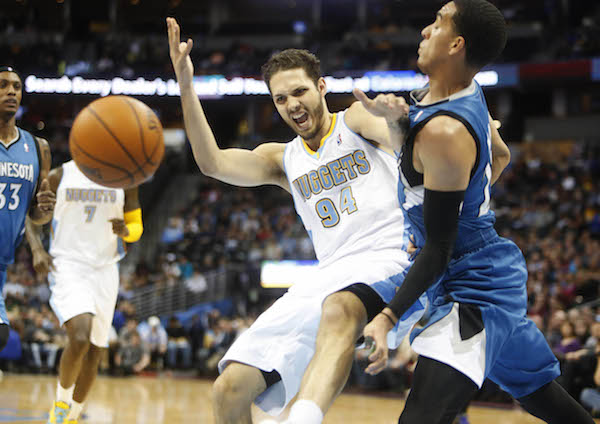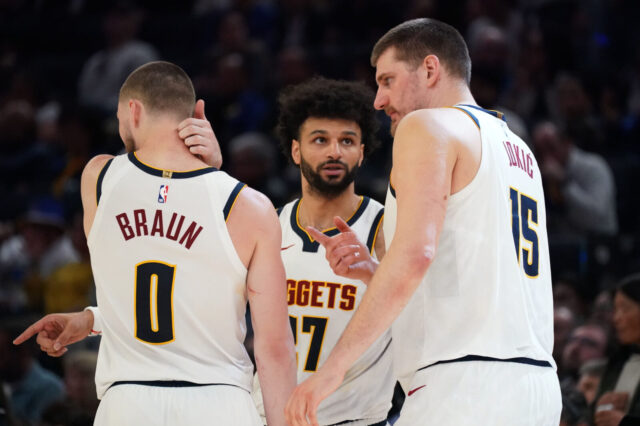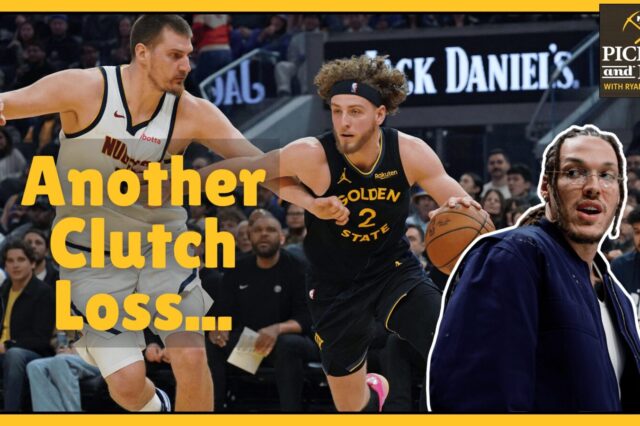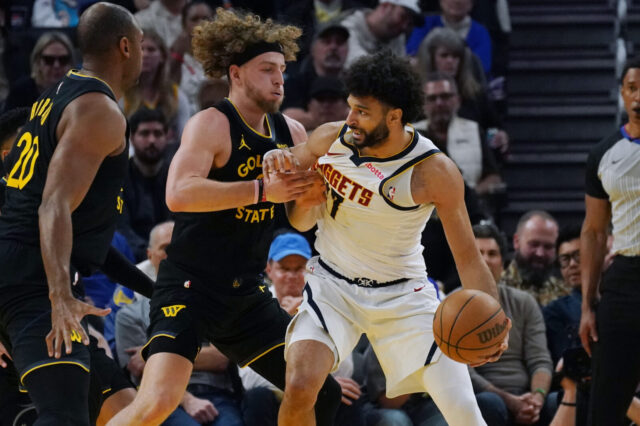Emmanuel Mudiay, born in the war-torn Democratic Republic of the Congo (formerly Zaire), was the Denver Nuggets’ highly-praised first pick of the 2015 NBA Draft. Widely considered a steal at No. 7 and graded by many as the top point guard in the draft, the Nuggets believe Mudiay will be a cornerstone of the franchise for years to come.
Mudiay, born in 1996, immigrated to the U.S. in 2002, following his mother who came in 2001 seeking asylum for her family. After graduating high school in Dallas, Mudiay elected to forego college basketball and played professionally in China for a year before entering the NBA ranks. His story is truly one of international success – a story the Nuggets hope he will build upon with still greater accomplishments here in Denver.
In the second round this year, the Nuggets stuck with the international theme and selected Serbian point guard Nikola Radicevic with the No. 57 overall pick. Radicevic does not bring nearly the same potential as Mudiay, but does represent an ongoing motif for Denver over the past two-and-a-half decades.
Mudiay and Radicevic join an increasingly long list of foreign-born players drafted by the Nuggets – 13 since 1999. In the team’s history, Denver has selected a total of 16 players born abroad (or claiming international citizenship) in the draft. One of those picks – Dikembe Mutombo – will enter the Basketball Hall of Fame, which happens later this year. Most – documented below – never saw the floor in an NBA game.
The Nuggets international draft history actually goes back over 30 years when they drafted Karl Tilleman, a Canadian national shooting guard. Tilleman was actually born in the U.S. (Ogden, Utah) and claimed Canadian nationality. He was better known for his international play, where he currently holds the record (tied with Carmelo Anthony, coincidentally, and Oscar Schmidt) for the most three-pointers in an Olympic game (10) playing for Canada.
Tilleman fell ill with the flu upon arriving in Denver and suited up for just one preseason game. In that game he severely twisted his ankle and was cut from the team. He left the NBA and decided to serve his mission with The Church of Jesus Chris of Latter-day Saints.
In an interesting side note, another one of Denver’s draft picks in 1984 was Cecil Exum of North Carolina who did not make an NBA roster but went on to a long career in the Australian National Basketball League. Exum’s son, Dante, was born in Australia and currently plays for the Utah Jazz after being drafted in 2014.
The Nuggets waited seven years before taking a gamble on another foreign-born player. It was the biggest, and easily best, international pick in the team’s history: Dikembe Mutombo Mpolondo Mukamba Jean-Jacques Wamutombo, the Congolese tower simply known in Denver as “Mount Mutombo.”
Drafted out of Georgetown, where he attended on a USAID Scholarship, Mutombo’s career in Denver, and then Houston (among other teams), is well-documented. He is a four-time NBA Defensive Player of the Year and eight-time All-Star and holds the Nuggets team record for blocks with 1,486. In total, he tallied 3,289 blocks in his NBA career, second all-time behind Hakeem Olajuwon. Mutombo was a part of countless memorable Nuggets moments, none larger than the larger-than-life big man clutching the ball at his head while rolling on the floor after the 8-seed Nuggets defeated the No. 1 seed Sonics in the first round of the 1994 NBA playoffs. In addition to his enormous presence on the court, Mutombo has gone on to be one of the most prolific humanitarians and ambassadors for the game of basketball. His size-22 shoes were both figuratively and literally impossible to fill upon his departure from Denver.
For as great a success as Mutombo was, their next international was an equally great failure. In the first round of the 1996 draft Denver selected Efthimios Rentzias, a 6-foot-11 center from Greece. Rentzias gained international attention in 1995 when he helped lead Greece to the Under-19 FIBA World Championship, being named the tournament MVP and defeating a United States team that featured such notable players as Vince Carter and Stephon Marbury. However, Rentzias opted to not sign with the Nuggets and continue playing in Europe. His rights moved from Denver to Atlanta to Philadelphia, where he played just 35 games in one season, 2002-03, with the 76ers before returning to Europe.
The Nuggets’ decision to select internationals really picked up momentum starting in 1999, beginning a stretch in which Denver went abroad in six of seven years. In ’99 they went big again, selecting Francisco Elson, a 7-footer from the Netherlands. Elson spent four years playing professionally in Europe before joining the Nuggets in 2003-04.
The most noteworthy point of Elson’s career in Denver came during the 2004 playoff series against Minnesota in which the big man went toe-to-toe with Kevin Garnett. During the very physical series Garnett threw a cheap shot at Elson’s groin, prompting the Nuggets’ big man to call Garnett “gay,” thus unleashing controversy from the gay and lesbian community. Elson later apologized for the slur.
In total, Elson logged 201 games, including 79 starts for the Nuggets, second-most among international draft picks after Mutombo. Elson went on notch a total of 149 starts in 472 NBA games and won a title with the Spurs in 2007.
Denver followed in 2000 with the selection of Mamadou N’Diaye, a 7-foot center from Senegal who played his college ball at Auburn, with the No. 26 pick. N’Diaye never suited up for Denver; instead, he was traded to Toronto less than a year after being drafted. He spent parts of two years with Toronto before being shipped to the D-League. He made short-lived returns to the Association before he was finally waived by the Clippers in 2005.
The Nuggets again tried to tap into African potential in 2001, selecting Ousmane Cisse, a Malian from St. Jude High Catholic High School in Montgomery, Ala. Denver used a pick acquired in the N’Diaye trade to select Cisse, who fell victim to injury and was released by the Nuggets before the regular season. He did rack up an impressive undefeated record as a professional in 2002, albeit as a member of the Harlem Globetrotters. He played in various North American minor leagues and the Israeli league before retiring in 2010.
Denver’s biggest international flop – and no, we’re not talking about the free throw-garnering Manu Ginobili type – came in 2002 with the No. 5 overall pick: Nikoloz Tskitishvili of Tbilisi, Georgia. One would think the Nuggets would have known better than to draft a player hyped by Mike D’Antoni – Tskitishvili’s coach in Italy – after D’Antoni proved such a failure in Denver, but at the time everyone in the NBA was looking for the next “Dirk.” Though he matched Nowitzki on the tape – 7 feet tall, 245 pounds – that’s where the comparisons stopped. In three seasons with the Nuggets, Tskitishvili averaged 3.8 points, 1.9 rebounds and shot 30 percent from the field while appearing in 143 total games. He played less than 30 more games with three different teams before being released and returning to Europe.
Were it not for the Detroit Pistons, Denver might have been labeled the league’s international laughingstock. Following the Tskitishvili pick, the Nuggets appeared to be headed in the direction of another international in 2003. Instead, Carmelo Anthony landed in their lap. With the second pick, Detroit opted to select Darko Milicic over Anthony. Milicic averaged just 1.58 PPG for Detroit in two-plus years before being traded. Anthony, meanwhile, went on to lead Denver to the playoffs in each of his first seven years with the team before being traded to New York. The worst-kept secret in basketball was that Denver would have selected Milicic with the No. 3 pick had Detroit not pulled the trigger first.
What most people fail to remember, however, is that Denver did make an international pick that same year: Slovenian Sani Becirovic. The second-round pick never suited up for Denver or any other team in the NBA.
In 2005 the Nuggets selected Axel Hervelle, the first Belgian ever drafted into the NBA, with the 52nd pick. Like Becirovic, Hervelle did not play a single minute in the NBA.
Denver took a brief hiatus from international picks between 2006 and 2008 (they had no picks in ’07 and ’08), but went fishing in those waters again in 2009 with Sergio Llull of Spain in the second round. The Rockets bought his draft rights from the Nuggets on draft night for a record-setting $2.25 million (the most for a second-round pick), but the guard never saw the floor in an NBA game.
The Nuggets finally found an international in 2012 who would see NBA action, France’s Evan Fournier, whom they selected No. 20 overall. They used their third pick that same year to select Izzet Turkyilmaz a 7-footer from Burhaniye, Turkey. Fournier averaged 7.4 PPG for Denver in 114 games before being traded to the Orlando Magic. Turkyilmaz played for the Nuggets during the 2012 Summer League, but never caught on with the big club.
In 2013 Denver again went to France, this time opting for size, selecting center Rudy Gobert with their only pick of the draft. Gobert was traded to Utah within ten days of the draft for Eric Green and cash.
While their “unofficial” 2014 draft pick, Jusuf Nurkic (acquired along with Gary Harris in a draft-day trade with the Bulls for Doug McDermott) immediately impacted the game, their other 2014 international pick, Nikola Jokic, has yet to play an NBA game. Instead, he spent another year with his Serbian club, Mega Vizura.
Like Jokic did in 2014-15, Radicevic is reportedly going to spend 2015-16 overseas refining his game. Jokic has a chance to redeem himself this year at the Summer League but it could be an uphill battle for him to find consistent playing time with the Nuggets, especially after the emergence of Nurkic last season and the trend towards “small ball” in the Association.
All told, Denver has drafted 13 foreign-born players since 1999. They have drafted just 14 U.S.-born players during that same stretch. Discounting Mudiay and Radicevic, only three (Elson, Tskitishvili and Fournier ever logged a minute of regular season NBA play for the Nuggets).
The Nuggets are hopeful about their new draft picks and believe they can live up to some of the high expectations set on them (at one point, Radicevic was ranked as the No. 6 international player born in 1994). If history is any indicator, there’s only a very slight chance that Radicevic will make any kind of impact. Mudiay, will likely be another story, as there’s a general consensus that he will not only be a solid NBA player, but has the potential to be a star and a leader.
With 48 percent of the team’s picks over the last 27 years going to foreign-born players, none of whom have fully panned-out for the team, Denver needs to hit big with Mudiay.



